10 aug 2018
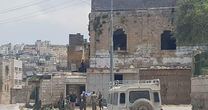
Extremist Israeli settlers assaulted on Friday a number of anti-settlement activists as well as homes in the neighborhood of Tel Rumeida in al-Khalil, in the southern occupied West Bank.
Murad Amr, coordinator of the Youth against Settlement campaign, said a number of settlers accompanied by soldiers assaulted activists while they were on a volunteering day carrying out cleaning and maintenance works in the area.
Amr added that the settlers also assaulted Palestinian homes and families in the area. video
Israeli Colonizers Attack Palestinians, Homes, In Hebron
Dozens of Israeli colonizers, illegally living on stolen Palestinian lands in the southern West Bank city of Hebron, attacked Friday several Palestinians and their homes in Tal Romedia area, in the center of the city.
Morad Amro, the coordinator of the Youth Coalition against Settlements, said the colonists attacked activists of the coalition, and several Palestinians, during an activity by volunteers aiming at conducting maintenance work in Tal Romedia.
He added that the assailants also attacked many homes, including the home of photojournalist Emad Abu Shamsiyya, and the family home of Hashem al-Azza, 54, who was killed in 2015, after suffering the severe effects of teargas inhalation, when dozens of soldiers invaded the Zawiya area in the city.
The colonizers also attacked Yousef al-Azza and his family while the activists were conducting repair work to preserve the family home, and the area around it.
Amro said that these constant violations and assaults aim at trying to force the Palestinians out of their homes and lands, so that Israel can illegally confiscate their property for the benefit of its colonial settlements and military occupation.
Murad Amr, coordinator of the Youth against Settlement campaign, said a number of settlers accompanied by soldiers assaulted activists while they were on a volunteering day carrying out cleaning and maintenance works in the area.
Amr added that the settlers also assaulted Palestinian homes and families in the area. video
Israeli Colonizers Attack Palestinians, Homes, In Hebron
Dozens of Israeli colonizers, illegally living on stolen Palestinian lands in the southern West Bank city of Hebron, attacked Friday several Palestinians and their homes in Tal Romedia area, in the center of the city.
Morad Amro, the coordinator of the Youth Coalition against Settlements, said the colonists attacked activists of the coalition, and several Palestinians, during an activity by volunteers aiming at conducting maintenance work in Tal Romedia.
He added that the assailants also attacked many homes, including the home of photojournalist Emad Abu Shamsiyya, and the family home of Hashem al-Azza, 54, who was killed in 2015, after suffering the severe effects of teargas inhalation, when dozens of soldiers invaded the Zawiya area in the city.
The colonizers also attacked Yousef al-Azza and his family while the activists were conducting repair work to preserve the family home, and the area around it.
Amro said that these constant violations and assaults aim at trying to force the Palestinians out of their homes and lands, so that Israel can illegally confiscate their property for the benefit of its colonial settlements and military occupation.
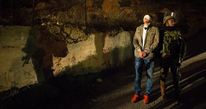
A number of Palestinians choked on teargas in clashes that broke out at daybreak Friday shortly after Israeli army patrols stormed Tulkarem refugee camp and attacked the locals.
Israeli soldiers cordoned off the home of a Palestinian ex-prisoner before they ransacked it, sparking clashes with Palestinian anti-occupation youth.
The occupation forces targeted the Palestinian protesters with teargas, resulting in dozens of suffocation cases.
Palestinian ex-prisoner Mohamed Farhana was kidnapped by Israeli forces in the assault.
The occupation soldiers ravaged Palestinian homes and subjected the residents to exhaustive questioning.
At predawn time, Israeli troops and settlers stormed Islamic sites in Kifl Haris town, north of Salfit, and performed provocative rituals, triggering tension in the area.
Israeli soldiers cordoned off the home of a Palestinian ex-prisoner before they ransacked it, sparking clashes with Palestinian anti-occupation youth.
The occupation forces targeted the Palestinian protesters with teargas, resulting in dozens of suffocation cases.
Palestinian ex-prisoner Mohamed Farhana was kidnapped by Israeli forces in the assault.
The occupation soldiers ravaged Palestinian homes and subjected the residents to exhaustive questioning.
At predawn time, Israeli troops and settlers stormed Islamic sites in Kifl Haris town, north of Salfit, and performed provocative rituals, triggering tension in the area.
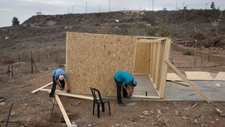
After initially seizing Palestinian land from four villages “for military purposes” last year, Israeli military authorities transferred the seized land to Israeli civilians in direct violation of the Fourth Geneva Convention, and is now recognizing the illegal colony ‘Adei Ad’.
The land on which the colony was constructed was stolen from Palestinian landowners in the villages of Turmusayya, Mughayyir, Jalud and Qaryut.
The area in question is about 205 dunams of land, located north of Ramallah, and south of Nablus, in the north-central part of the West Bank.
In its recognition of the outpost on Wednesday, in the midst of a bombing campaign on Gaza, Israeli authorities explicitly recognized the legitimacy of a colony that was constructed in violation of Israeli law.
According to Israeli sources, the aim of the legitimization of the outpost of Adei Ad is to expand the existing settlement of Amichai, which is located deep within Palestinian Territory in the West Bank, and was itself constructed on stolen Palestinian land.
The idea, according to the Israeli sources, is to vastly expand the Israeli settlement presence in the central West Bank, in order to expand the state of Israel further onto Palestinian land.
Since its creation in 1948, the state of Israel has never officially declared its borders, and has used military and paramilitary force to continually expand its land base onto what had been Palestinian land.
The large settlement of Amichai was initially constructed to transfer Israeli colonists who were moved from the illegal outpost of Amona. Since that time, the colonists, made up of paramilitary forces and their families, have expanded the land base of their colony onto stolen Palestinian land. In addition, the settler-only roads leading from inside Israel to the settlement colony discriminate against Palestinians and do not allow them to drive on the roads, or even to cross the roads to reach their land.
Adei Ad was constructed a year ago, several kilometers east of Amichai, without licenses or permits from the Israeli government. But Israeli policy allows for colonies to be recognized and receive services from the Israeli government, including water, electricity and sewage services, once they establish themselves illegally on stolen Palestinian land and remain in place for a certain period – despite the fact that they were initially created in violation of Israeli law.
The recognition of the colony of Adei Ad comes despite the fact that there is an active appeal process in the Israeli court system, filed by the Palestinian landowners whose land was confiscated by the Israeli military and then turned over to paramilitary forces for the construction of the colony.
According to an expose’ of the Adei Ad settlement colony by the Israeli human rights group Yesh Din, “Yesh Din has documented 96 offenses committed by Israeli civilians against Palestinians in the area of the outpost since its establishment. These offenses include: violence, land seizure and property offenses.”
The full report by Yesh Din about the Adei Ad settlement can be found here.
The land on which the colony was constructed was stolen from Palestinian landowners in the villages of Turmusayya, Mughayyir, Jalud and Qaryut.
The area in question is about 205 dunams of land, located north of Ramallah, and south of Nablus, in the north-central part of the West Bank.
In its recognition of the outpost on Wednesday, in the midst of a bombing campaign on Gaza, Israeli authorities explicitly recognized the legitimacy of a colony that was constructed in violation of Israeli law.
According to Israeli sources, the aim of the legitimization of the outpost of Adei Ad is to expand the existing settlement of Amichai, which is located deep within Palestinian Territory in the West Bank, and was itself constructed on stolen Palestinian land.
The idea, according to the Israeli sources, is to vastly expand the Israeli settlement presence in the central West Bank, in order to expand the state of Israel further onto Palestinian land.
Since its creation in 1948, the state of Israel has never officially declared its borders, and has used military and paramilitary force to continually expand its land base onto what had been Palestinian land.
The large settlement of Amichai was initially constructed to transfer Israeli colonists who were moved from the illegal outpost of Amona. Since that time, the colonists, made up of paramilitary forces and their families, have expanded the land base of their colony onto stolen Palestinian land. In addition, the settler-only roads leading from inside Israel to the settlement colony discriminate against Palestinians and do not allow them to drive on the roads, or even to cross the roads to reach their land.
Adei Ad was constructed a year ago, several kilometers east of Amichai, without licenses or permits from the Israeli government. But Israeli policy allows for colonies to be recognized and receive services from the Israeli government, including water, electricity and sewage services, once they establish themselves illegally on stolen Palestinian land and remain in place for a certain period – despite the fact that they were initially created in violation of Israeli law.
The recognition of the colony of Adei Ad comes despite the fact that there is an active appeal process in the Israeli court system, filed by the Palestinian landowners whose land was confiscated by the Israeli military and then turned over to paramilitary forces for the construction of the colony.
According to an expose’ of the Adei Ad settlement colony by the Israeli human rights group Yesh Din, “Yesh Din has documented 96 offenses committed by Israeli civilians against Palestinians in the area of the outpost since its establishment. These offenses include: violence, land seizure and property offenses.”
The full report by Yesh Din about the Adei Ad settlement can be found here.
8 aug 2018
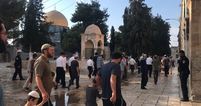
Dozens of Israeli settlers on Wednesday morning broke into al-Aqsa Mosque amid heavy police presence.
The Israeli police opened al-Maghareba Gate at 7 a.m. in preparation for the settler break-in, according to Quds Press.
Escorted by special police forces, 75 settlers entered the Mosque, roamed its courtyards and performed Talmudic rituals.
Quds Press said that 40 Jewish students of religious institutes were present in al-Aqsa Mosque during the same period.
The Israeli police usually allow another round of settler break-ins into the Islamic holy site after noon prayer.
The Israeli police opened al-Maghareba Gate at 7 a.m. in preparation for the settler break-in, according to Quds Press.
Escorted by special police forces, 75 settlers entered the Mosque, roamed its courtyards and performed Talmudic rituals.
Quds Press said that 40 Jewish students of religious institutes were present in al-Aqsa Mosque during the same period.
The Israeli police usually allow another round of settler break-ins into the Islamic holy site after noon prayer.
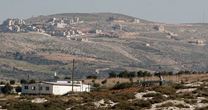
The Israeli occupation is planning to expand the isolated settlement of Amichai to nearly three times its current size so that it will include the illegal outpost of Adei Ad, Haaretz has learned.
The immediate purpose of the expansion is to turn Adei Ad into a kind of distant neighborhood in Amichai. After the expansion, Amichai will be a large jurisdiction run by settlers in the heart of the West Bank.
The area, known as the Shiloh Valley, is located north of Ramallah and the settlement of Ofra and south of the settlement of Ariel, and is outside of and quite a distance from what is usually referred to as the settlement blocs. Construction in this area is considered an obstacle to implementing the two-state solution, Haaretz said.
According to the same source, administration by settlers will make it difficult to enforce planning laws there and will enable settlement construction in the future. Sources familiar with the details of the plan conceded that at this point the goal of increasing the jurisdiction of Amichai is to legalize Adei Ad.
Amichai was established for the settlers evacuated from the illegal settlement of Amona in the northern occupied West Bank, and is now home to some 40 Israeli settler families.
According to the plan approved at the time of Amichai’s establishment, the Israeli occupation authorities were to expand Amichai settlement by 60 more housing units at first, and by about 300 more units in the future. These units were allocated a large area near the settlement of Shiloh and a few other relatively isolated settlements and outposts.
The illegal outpost of Adei Ad, a few kilometers east of Amichai, was built on Palestinian land without legal permits. The government never evacuated it and declared on a number of occasions that it intended to legalize it.
According to the Civil Administration map, which Haaretz has obtained, the Civil Administration intends to legalize a large area around Adei Ad, including the outpost itself, to nearly double the size of Amichai and to bring Adei Ad into its jurisdiction.
The Palestinians, represented by the NGO Yesh Din, argue that expansion of Amichai will deny them access to their farmland.
Yesh Din’s attorney, Shlomi Zecharia, said, “The inhabitants of the villages near the outpost have become hostages to the policy that abundantly rewards prizes and gifts to ideological criminals. Cutting off farmlands by means of a false [expansion of] jurisdiction is extreme, disproportionate and needless, and in fact is intended to perpetuate restrictions on and infringement of Palestinian property, this time under the official auspices of the government.”
One of the immediate consequences of designating the expanded area as part of Amichai is that responsibility for enforcement of construction laws will no longer be in the hands of the Civil Administration, but rather will fall to the Mateh Binyamin Regional Council. Except in the rarest cases, the council does not enforce the law against illegal construction in its jurisdiction.
As a result of the transfer of administrative powers, the settlers will be able to build new structures illegally without effective enforcement, Haaretz further warned.
The immediate purpose of the expansion is to turn Adei Ad into a kind of distant neighborhood in Amichai. After the expansion, Amichai will be a large jurisdiction run by settlers in the heart of the West Bank.
The area, known as the Shiloh Valley, is located north of Ramallah and the settlement of Ofra and south of the settlement of Ariel, and is outside of and quite a distance from what is usually referred to as the settlement blocs. Construction in this area is considered an obstacle to implementing the two-state solution, Haaretz said.
According to the same source, administration by settlers will make it difficult to enforce planning laws there and will enable settlement construction in the future. Sources familiar with the details of the plan conceded that at this point the goal of increasing the jurisdiction of Amichai is to legalize Adei Ad.
Amichai was established for the settlers evacuated from the illegal settlement of Amona in the northern occupied West Bank, and is now home to some 40 Israeli settler families.
According to the plan approved at the time of Amichai’s establishment, the Israeli occupation authorities were to expand Amichai settlement by 60 more housing units at first, and by about 300 more units in the future. These units were allocated a large area near the settlement of Shiloh and a few other relatively isolated settlements and outposts.
The illegal outpost of Adei Ad, a few kilometers east of Amichai, was built on Palestinian land without legal permits. The government never evacuated it and declared on a number of occasions that it intended to legalize it.
According to the Civil Administration map, which Haaretz has obtained, the Civil Administration intends to legalize a large area around Adei Ad, including the outpost itself, to nearly double the size of Amichai and to bring Adei Ad into its jurisdiction.
The Palestinians, represented by the NGO Yesh Din, argue that expansion of Amichai will deny them access to their farmland.
Yesh Din’s attorney, Shlomi Zecharia, said, “The inhabitants of the villages near the outpost have become hostages to the policy that abundantly rewards prizes and gifts to ideological criminals. Cutting off farmlands by means of a false [expansion of] jurisdiction is extreme, disproportionate and needless, and in fact is intended to perpetuate restrictions on and infringement of Palestinian property, this time under the official auspices of the government.”
One of the immediate consequences of designating the expanded area as part of Amichai is that responsibility for enforcement of construction laws will no longer be in the hands of the Civil Administration, but rather will fall to the Mateh Binyamin Regional Council. Except in the rarest cases, the council does not enforce the law against illegal construction in its jurisdiction.
As a result of the transfer of administrative powers, the settlers will be able to build new structures illegally without effective enforcement, Haaretz further warned.
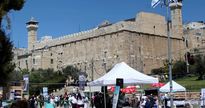
The Israeli occupation authorities announced on Wednesday their decision to close the Ibrahimi Mosque in the West Bank city of al-Khalil before Muslim worshipers.
Director of the Ibrahimi Mosque Hefdhi Abu Esneineh said the occupation authorities will block entrances to the site as of Wednesday 10:00 p.m. until Thursday 10:00 p.m. under the pretext of Jewish holidays.
He added that such closure decisions have been repeatedly issued following the notorious Ibrahimi Mosque massacre perpetrated in 1994 by a Jewish settler against Muslim worshipers.
Palestinian residents of al-Khalil’s Old City face a large Israeli military presence on a daily basis, with dozens of checkpoints set up at the entrances of many streets, as well as the entrance of the Ibrahimi Mosque itself.
Meanwhile, hundreds of notoriously violent Jewish settlers in al-Khalil move freely on the street, drive cars, and carry machine guns.
Director of the Ibrahimi Mosque Hefdhi Abu Esneineh said the occupation authorities will block entrances to the site as of Wednesday 10:00 p.m. until Thursday 10:00 p.m. under the pretext of Jewish holidays.
He added that such closure decisions have been repeatedly issued following the notorious Ibrahimi Mosque massacre perpetrated in 1994 by a Jewish settler against Muslim worshipers.
Palestinian residents of al-Khalil’s Old City face a large Israeli military presence on a daily basis, with dozens of checkpoints set up at the entrances of many streets, as well as the entrance of the Ibrahimi Mosque itself.
Meanwhile, hundreds of notoriously violent Jewish settlers in al-Khalil move freely on the street, drive cars, and carry machine guns.
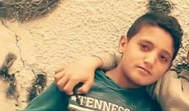
An Israeli settler driving east of Qalqilya hit a Palestinian young man on Tuesday evening, leaving him wounded.
An Israeli settler crept into Jinsafout town, east of Qalqilya, and attempted to ram his car into Palestinian civilians.
The settler, driving a Mazda car with an Israeli vehicle registration plate, moved several other meters into the town before he ran over Jihad Mahmoud Bashir, 25, and fled right away.
The young man was evacuated to Darwish Nazal Hospital in Qalqilya for treatment.
Israeli army troops showed up at the scene and inspected surveillance cameras.
An Israeli settler crept into Jinsafout town, east of Qalqilya, and attempted to ram his car into Palestinian civilians.
The settler, driving a Mazda car with an Israeli vehicle registration plate, moved several other meters into the town before he ran over Jihad Mahmoud Bashir, 25, and fled right away.
The young man was evacuated to Darwish Nazal Hospital in Qalqilya for treatment.
Israeli army troops showed up at the scene and inspected surveillance cameras.

Representative of the Wall and Settlement Resistance Committee in Bethlehem, Hassan Brejiyyeh, on Tuesday, revealed the arrival of U.S. delegations from political and tourism companies, in order to carry out investment projects in two Bethlehem settlements.
In an interview with Voice of Palestine radio, Brejiyyeh said that American companies are currently investing in Israeli settlement tourism projects, specifically in the settlements of Eliazar and Efrat, which are located on lands of Palestinian citizens.
Such projects, settlement plans, construction of streets, tunnels and rail roads are part of the Israeli occupation project to establish ”Greater Jerusalem” plan and link Jerusalem to the Gush Etzion settlement, to cut the West Bank in half and seize more Palestinian land.
In an interview with Voice of Palestine radio, Brejiyyeh said that American companies are currently investing in Israeli settlement tourism projects, specifically in the settlements of Eliazar and Efrat, which are located on lands of Palestinian citizens.
Such projects, settlement plans, construction of streets, tunnels and rail roads are part of the Israeli occupation project to establish ”Greater Jerusalem” plan and link Jerusalem to the Gush Etzion settlement, to cut the West Bank in half and seize more Palestinian land.
7 aug 2018
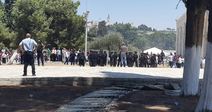
Dozens of Israeli settlers on Tuesday broke into al-Aqsa Mosque via al-Maghareba Gate under the protection of the Israeli police forces.
Quds Press said that several groups of Israeli settlers broke into the Mosque in two rounds: the morning and the afternoon, amid heavy presence of Israeli policemen.
The news agency added that 145 settlers and 23 Jewish students visited the Mosque in the morning, while 23 settlers came for another visit in the afternoon.
The Israeli police usually allow settlers to visit the Mosque for five hours a day and escort them as they roam its courtyards and perform Talmudic rituals in the Islamic site.
Quds Press said that several groups of Israeli settlers broke into the Mosque in two rounds: the morning and the afternoon, amid heavy presence of Israeli policemen.
The news agency added that 145 settlers and 23 Jewish students visited the Mosque in the morning, while 23 settlers came for another visit in the afternoon.
The Israeli police usually allow settlers to visit the Mosque for five hours a day and escort them as they roam its courtyards and perform Talmudic rituals in the Islamic site.
6 aug 2018
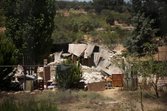
The Samara home in Beit al-Baraka after it was destroyed by Israel settlers.
Israeli settlers, escorting a bulldozer, on Monday, demolished two Palestinian homes at Beit al-Baraka church compound at the Hebron-Jerusalem road, despite the presence of a court order allowing the owners to stay in their homes, according to the owner of the two homes, Ahmad Samara.
He told WAFA that scores of settlers from several hardcore illegal settlements, including Kiryat Arba, north of Hebron, and protected by Israeli forces, escorted a bulldozer into Beit al-Baraka church compound and proceeded to demolished the two homes where he and his family had lived for over 40 years.
Samara said that when the family attempted to stop the demolition and to show the army the Israeli court order that allows it stay in the homes, the soldiers and settlers assaulted him and his family, threw them out of their homes and detained his daughter, Asmaa, 32.
“I have lived in these two homes for over 40 years. I have an ]Israeli[ court ruling preventing settlers from bothering us and allowing me and my family to continue to live in the homes,” said Samara. “We have no where to go now.”
He said the settlers and soldiers ransacked his homes and prevented him from removing his belongings before they carried out the demolition at gun point.
Beit al-Baraka, meaning “House of Blessing”, built 70 years ago, is a 38-dunam (9.5-acre) church compound located on the main road between Bethlehem and Hebron, opposite to Arroub refugee camp. It used to serve as a hospital providing free treatment to people suffering from tuberculosis until it was shut down in 1983.
Jewish settlers later bought the compound from the church, through a fake company.
Israeli settlers, escorting a bulldozer, on Monday, demolished two Palestinian homes at Beit al-Baraka church compound at the Hebron-Jerusalem road, despite the presence of a court order allowing the owners to stay in their homes, according to the owner of the two homes, Ahmad Samara.
He told WAFA that scores of settlers from several hardcore illegal settlements, including Kiryat Arba, north of Hebron, and protected by Israeli forces, escorted a bulldozer into Beit al-Baraka church compound and proceeded to demolished the two homes where he and his family had lived for over 40 years.
Samara said that when the family attempted to stop the demolition and to show the army the Israeli court order that allows it stay in the homes, the soldiers and settlers assaulted him and his family, threw them out of their homes and detained his daughter, Asmaa, 32.
“I have lived in these two homes for over 40 years. I have an ]Israeli[ court ruling preventing settlers from bothering us and allowing me and my family to continue to live in the homes,” said Samara. “We have no where to go now.”
He said the settlers and soldiers ransacked his homes and prevented him from removing his belongings before they carried out the demolition at gun point.
Beit al-Baraka, meaning “House of Blessing”, built 70 years ago, is a 38-dunam (9.5-acre) church compound located on the main road between Bethlehem and Hebron, opposite to Arroub refugee camp. It used to serve as a hospital providing free treatment to people suffering from tuberculosis until it was shut down in 1983.
Jewish settlers later bought the compound from the church, through a fake company.
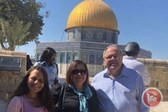
The Consul General of Israel in New York, Dani Dayan, entered the Al-Aqsa Mosque compound in the Old City of occupied East Jerusalem on Monday morning.
Locals said that Dayan entered the Al-Aqsa Mosque compound along with his wife and daughter under armed security by Israeli forces.
While in the compound, Dayan said that the "Al-Aqsa Mosque is the property of the Jewish people and it will be so in the future."
The Al-Aqsa Mosque compound, which sits just above the Western Wall plaza, houses both the Dome of the Rock and Al-Aqsa Mosque. The third holiest site in Islam, it is also venerated as Judaism's most holy place, as it sits where Jews believe the First and Second Temples once stood.
While Jewish visitation is permitted to the compound, non-Muslim worship at Al-Aqsa is prohibited according to an agreement signed between Israel and the Jordanian government after Israel’s illegal occupation of East Jerusalem in 1967.
Despite the agreement with Jordan -- which is the custodian of Al-Aqsa -- Israeli authorities regularly allow Jewish visitors to enter the site, often under armed guard. Such visits are typically made by right-wingers attempting to unsettle the status quo at the site, and coincide with restrictions on Palestinian access, including bans on entrance and detentions.
Locals said that Dayan entered the Al-Aqsa Mosque compound along with his wife and daughter under armed security by Israeli forces.
While in the compound, Dayan said that the "Al-Aqsa Mosque is the property of the Jewish people and it will be so in the future."
The Al-Aqsa Mosque compound, which sits just above the Western Wall plaza, houses both the Dome of the Rock and Al-Aqsa Mosque. The third holiest site in Islam, it is also venerated as Judaism's most holy place, as it sits where Jews believe the First and Second Temples once stood.
While Jewish visitation is permitted to the compound, non-Muslim worship at Al-Aqsa is prohibited according to an agreement signed between Israel and the Jordanian government after Israel’s illegal occupation of East Jerusalem in 1967.
Despite the agreement with Jordan -- which is the custodian of Al-Aqsa -- Israeli authorities regularly allow Jewish visitors to enter the site, often under armed guard. Such visits are typically made by right-wingers attempting to unsettle the status quo at the site, and coincide with restrictions on Palestinian access, including bans on entrance and detentions.
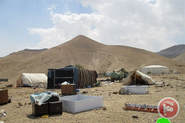
Israeli settlers, along with Israeli forces, assaulted Palestinian residents of the al-Muarrajat Bedouin village, northeast of the occupied West Bank district of Ramallah on Monday.
Locals said that armed Israeli settlers stormed the Bedouin village under heavy protection by Israeli forces.
Sources added that Israeli forces assaulted residents, some Israeli solidarity activists and the staff members of the Wall and Settlement Resistance Committee, who were present in the area.
Following the assault, Israeli forces detained six Palestinian residents.
Sources mentioned that Israeli forces prevented the rest of the Wall and Settlement Resistance Committee staff and other Israeli activists from reaching the Bedouin village of al-Muarrajat.
Many Palestinians have pointed out that Israeli settler attacks against the Palestinian community are very common and often go unpunished by the Israeli authorities.
Only 1.9 percent of complaints submitted by Palestinians against Israeli settler attacks result in a conviction, the Israeli human rights group Yesh Din reported.
Locals said that armed Israeli settlers stormed the Bedouin village under heavy protection by Israeli forces.
Sources added that Israeli forces assaulted residents, some Israeli solidarity activists and the staff members of the Wall and Settlement Resistance Committee, who were present in the area.
Following the assault, Israeli forces detained six Palestinian residents.
Sources mentioned that Israeli forces prevented the rest of the Wall and Settlement Resistance Committee staff and other Israeli activists from reaching the Bedouin village of al-Muarrajat.
Many Palestinians have pointed out that Israeli settler attacks against the Palestinian community are very common and often go unpunished by the Israeli authorities.
Only 1.9 percent of complaints submitted by Palestinians against Israeli settler attacks result in a conviction, the Israeli human rights group Yesh Din reported.
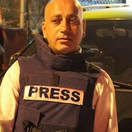
Nader Baybars
The Israeli occupation forces (IOF) last night and on Monday morning kidnapped 16 Palestinian citizens, including two journalists, in the West Bank and Jerusalem.
According to the Palestinian Prisoner Society, five citizens were taken prisoners during an IOF campaign in al-Khalil.
The detainees were identified as Abdullah al-Harroub, Firas Abu Sharkh, Hazem al-Jiyawi, Ibrahim Annajjar and Wa’el Abu Sharkh.
The IOF also kidnapped four brothers working as shepherds in al-Marj area, west of Jericho, after they defended themselves when a horde of Jewish settlers harassed and assaulted them.
Journalist Ibrahim al-Rantisi and another citizen were kidnapped from their homes in an IOF campaign in Ramallah and Bireh province.
A photojournalist called Nader Baybars was also rounded up by Israeli police forces during a raid on his house in Wadi al-Joz neighborhood in east Jerusalem.
Another four citizens were kidnapped by the IOF in Bethlehem, Tulkarem and Qalqilya.
Settlers attack Palestinian family, IOF arrests 4 brothers
A group of Israeli settlers on Monday morning attacked a Palestinian family in al-Ma'rajat Bedouin community near al-Taybeh village, northeast of Ramallah city.
Head of the Bedouin community Ali Mlihat told Quds Press that scores of Israeli settlers assaulted his sons while they were working in their farmlands early in the morning.
Mlihat said that the Israeli occupation forces (IOF) later arrived in the place and detained his four sons Mohammed, Khalif, Tayel and Omar after the settlers claimed that they were the ones who attacked them.
He added that his sons were transferred to an unknown destination and that he has not been allowed to see them yet.
A number of Israeli settlers about ten days ago attacked other Palestinian families in the same area. The IOF soldiers usually provide protection to the settlers in such incidents.
The Israeli occupation forces (IOF) last night and on Monday morning kidnapped 16 Palestinian citizens, including two journalists, in the West Bank and Jerusalem.
According to the Palestinian Prisoner Society, five citizens were taken prisoners during an IOF campaign in al-Khalil.
The detainees were identified as Abdullah al-Harroub, Firas Abu Sharkh, Hazem al-Jiyawi, Ibrahim Annajjar and Wa’el Abu Sharkh.
The IOF also kidnapped four brothers working as shepherds in al-Marj area, west of Jericho, after they defended themselves when a horde of Jewish settlers harassed and assaulted them.
Journalist Ibrahim al-Rantisi and another citizen were kidnapped from their homes in an IOF campaign in Ramallah and Bireh province.
A photojournalist called Nader Baybars was also rounded up by Israeli police forces during a raid on his house in Wadi al-Joz neighborhood in east Jerusalem.
Another four citizens were kidnapped by the IOF in Bethlehem, Tulkarem and Qalqilya.
Settlers attack Palestinian family, IOF arrests 4 brothers
A group of Israeli settlers on Monday morning attacked a Palestinian family in al-Ma'rajat Bedouin community near al-Taybeh village, northeast of Ramallah city.
Head of the Bedouin community Ali Mlihat told Quds Press that scores of Israeli settlers assaulted his sons while they were working in their farmlands early in the morning.
Mlihat said that the Israeli occupation forces (IOF) later arrived in the place and detained his four sons Mohammed, Khalif, Tayel and Omar after the settlers claimed that they were the ones who attacked them.
He added that his sons were transferred to an unknown destination and that he has not been allowed to see them yet.
A number of Israeli settlers about ten days ago attacked other Palestinian families in the same area. The IOF soldiers usually provide protection to the settlers in such incidents.
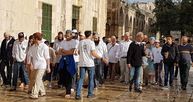
Dozens of Israeli settlers stormed on Monday morning Jerusalem’s al-Aqsa Mosque—the third holiest site in Islam—via the Maghareba Gate.
Media chief at Jerusalem’s Awqaf Department, Firas al-Dabes, said over 90 Israeli settlers, escorted by policemen, broke into al-Aqsa Mosque as part of the morning break-in shift and carried out a round of sacrilegious tours that lasted for about four hours.
Six members of Israel’s court authority also showed up at the site during the break-in.
Dozens more are expected to show up at the site in the next few hours.
At the same time, the peaceful Muslim worshipers have been subjected to tough crackdowns and restrictions by the Israeli police near the main entrances to the site.
Several worshipers have been searched and dozens more have had their IDs seized while attempting to enter al-Aqsa to perform their daily prayers.
Media chief at Jerusalem’s Awqaf Department, Firas al-Dabes, said over 90 Israeli settlers, escorted by policemen, broke into al-Aqsa Mosque as part of the morning break-in shift and carried out a round of sacrilegious tours that lasted for about four hours.
Six members of Israel’s court authority also showed up at the site during the break-in.
Dozens more are expected to show up at the site in the next few hours.
At the same time, the peaceful Muslim worshipers have been subjected to tough crackdowns and restrictions by the Israeli police near the main entrances to the site.
Several worshipers have been searched and dozens more have had their IDs seized while attempting to enter al-Aqsa to perform their daily prayers.
